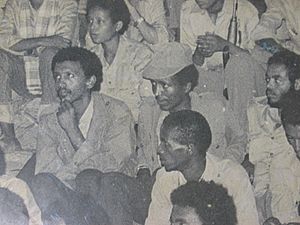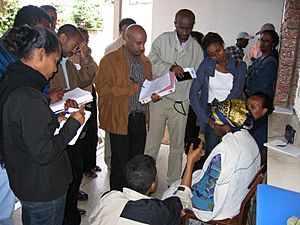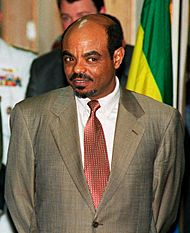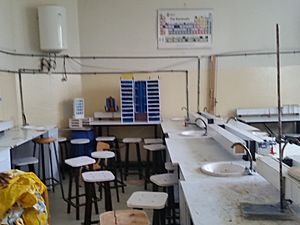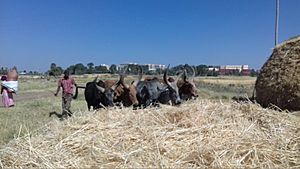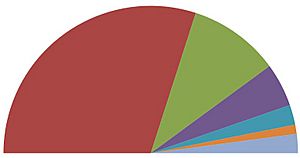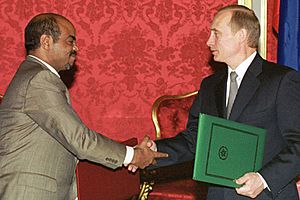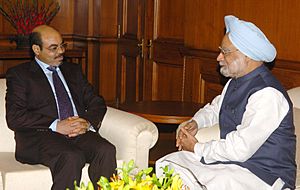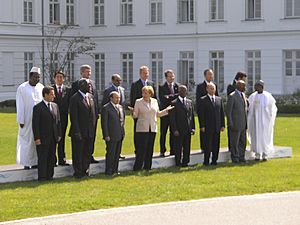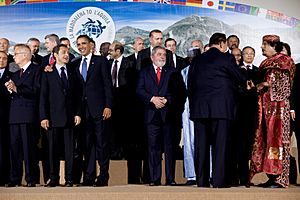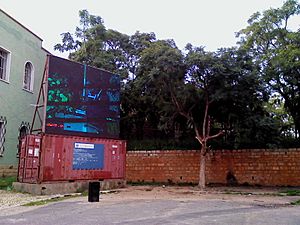Meles Zenawi facts for kids
Quick facts for kids
Meles Zenawi
|
|
|---|---|
|
መለስ ዜናዊ
|
|
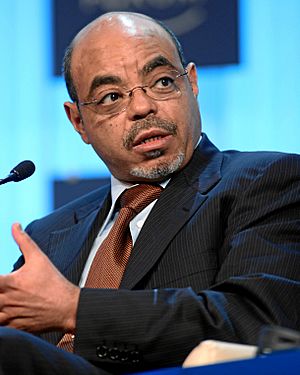
Meles in 2012
|
|
| Prime Minister of Ethiopia | |
| In office 23 August 1995 – 20 August 2012 |
|
| President | Negasso Gidada Girma Wolde-Giorgis |
| Preceded by | Tamirat Layne |
| Succeeded by | Hailemariam Desalegn |
| Interim President of Ethiopia | |
| In office 28 May 1991 – 22 August 1995 |
|
| Prime Minister | Tesfaye Dinka Tamirat Layne |
| Preceded by | Tesfaye Gebre Kidan (Acting) |
| Succeeded by | Negasso Gidada |
| Member of the House of People's Representatives |
|
| In office 19 May 1995 – 20 August 2012 |
|
| Constituency | Adwa |
| Personal details | |
| Born |
Legesse Zenawi Asres
9 May 1955 Adwa, Tigray Province, Ethiopian Empire |
| Died | 20 August 2012 (aged 57) Brussels, Belgium |
| Political party | Tigray People's Liberation Front |
| Other political affiliations |
Ethiopian People's Revolutionary Democratic Front Marxist–Leninist League of Tigray |
| Spouse | Azeb Mesfin |
| Children | 3 |
| Military service | |
| Allegiance | Tigray People's Liberation Front |
| Battles/wars | Ethiopian Civil War |
Meles Zenawi Asres (born Legesse Zenawi Asres on 9 May 1955 – died 20 August 2012) was an Ethiopian soldier and politician. He served as the President of Ethiopia from 1991 to 1995. Later, he became the Prime Minister of Ethiopia in 1995 and held this position until his death in 2012.
Meles was born in Adwa, Ethiopia. He became interested in politics after a university student named Meles Takele was executed in 1975. He then changed his first name from Legesse to Meles in honor of him. That same year, he left Haile Selassie I University. He joined the Tigray People's Liberation Front (TPLF) to fight against the Derg government. The Derg was a military government led by Mengistu Haile Mariam. In 1989, Meles became the leader of the TPLF. He also led the Ethiopian People's Revolutionary Democratic Front (EPRDF), which was formed in 1988.
Meles led the EPRDF to victory in the Ethiopian Civil War. He then served as president of the Transitional Government of Ethiopia from 1991 to 1995. After that, he became the second prime minister of Ethiopia in 1995. He remained prime minister until he passed away in 2012. His government introduced a system called ethnic federalism. This system aimed to allow different ethnic groups to share their own languages, cultures, and lands. During his presidency, Eritrea became independent from Ethiopia in 1993 after a special vote. However, the two countries later fought a war from 1998 to 2000 over land disputes.
During Meles Zenawi's time as prime minister, Ethiopia's economy grew very quickly. He made big changes to the country. These included efforts to improve farming and expand schools. He passed away in Brussels, Belgium, on 20 August 2012, due to an illness. His ideas and policies, especially ethnic federalism, are sometimes called "Zenawism."
Contents
Early Life and Education
Meles was born in Adwa, northern Ethiopia. His father, Zenawi Asres, was Tigrayan, and his mother, Alemash Ghebreluel, was Eritrean. He was one of six children. His birth name was Legesse. He later adopted the name Meles to honor Meles Tekle. Meles Tekle was a university student from Tigray who was executed by the Derg government in 1975.
Meles went to Queen of Sheba Junior High School in Adwa. He started school at age 11 or 12. He finished the 8-year program in just 5 years because he was very smart. He then attended the famous General Wingate High School in Addis Ababa on a scholarship. He graduated with honors in 1972. He received the Haile Selassie I Prize, given to top students. In 1975, Meles left university to join the Tigray People's Liberation Front. Meles Zenawi was an Orthodox Christian.
Becoming a Leader
Fighting in the Civil War (1974–1991)
Meles first joined the Tigrayan National Organization (TNO). This group later became the Tigray People's Liberation Front (TPLF). The TPLF was one of the armed groups fighting against the Derg. The Derg was the military government that ruled Ethiopia from 1974 to 1991.
Meles was chosen to be part of the TPLF's leadership in 1979. By 1983, he became the chairman of the TPLF. He also led the EPRDF. After the EPRDF won the Ethiopian Civil War in 1991, Meles became president. He led the Transitional Government of Ethiopia. During this time, he helped pave the way for Eritrea to become independent.
President of Ethiopia (1991–1995)
National Changes
Meles said that the EPRDF's victory honored the many TPLF fighters who died. It also honored the millions of Ethiopians who suffered from famine and violence under the Derg government. He believed that strong support from farmers and rural areas helped the EPRDF bring peace.
The United States helped arrange peace talks in 1991 to end the civil war. These talks did not lead to an agreement. The EPRDF forces were moving towards the capital, and the Derg leader fled the country. The United States then supported the EPRDF.
In July 1991, a meeting called the Convention of Nationalities was held. This was the first time different groups in Ethiopia had equal representation. International organizations like the United Nations observed this meeting.
Foreign Relations
Meles and his government said they wanted a united Ethiopia that included Eritrea. However, Meles allowed Eritrea to vote on its independence. This was because the TPLF had fought alongside Eritrean groups. The vote for independence happened on 24 May 1993. Isaias Afewerki became the leader of Eritrea. Meles was present at the independence celebration. Many people in Ethiopia were upset about Eritrea gaining independence.
Despite working together against the Derg, Meles and Isaias later had problems. The Eritrean–Ethiopian War started in May 1998. It began after Eritrean troops moved into disputed border areas. Ethiopia demanded that Eritrea withdraw its troops. When Eritrea refused, Ethiopia launched a large counter-attack. A peace treaty was signed in 2000.
Prime Minister of Ethiopia (1995–2012)
A new constitution was approved in 1994. It created a system where the prime minister leads the government. The president became the ceremonial head of state. The EPRDF easily won the 1995 elections. Meles became prime minister on 21 August 1995.
First Term (1995–2000)
As prime minister, Meles encouraged the privatization of government companies and farms. This was a change from the previous communist rule.
Ethnic Federalism
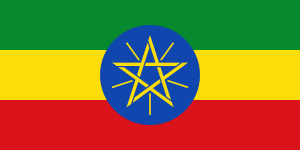
Meles's government introduced ethnic-based federalism. This system aimed to give all ethnic groups in Ethiopia the chance to share their cultures and languages. Supporters believed it would help fight poverty and give local people more say. Critics worried it might divide the country. Meles argued that ethnicity would become less of an issue as the economy grew.
Under this system, different Regions of Ethiopia have their own official state languages. For example, Afaan Oromo is the official language in the Oromia Region. Amharic is the official working language in several other regions.
Freedom of Religion
Religion in Ethiopia (2016 estimate) Ethiopian Orthodox (43.8%) Muslim (31.3%) Protestant (22.8%) Catholic (0.7%) Traditional faiths (0.6%) Other (0.8%)
Meles's government officially allowed freedom of religion in 1991. This helped resolve past issues. These issues included the dominance of the Orthodox Church and persecution of non-Orthodox Christians.
Freedom of Press
Before Meles, media rights were limited. During his time, entertainment media grew. FM radio stations were licensed to regional governments and private companies. The government also licensed seven regional state television agencies.
Economic Growth
Meles's government focused on policies that helped the poor. Ethiopia's economy grew steadily under his leadership. For seven years, the country's GDP grew by about 9 percent each year. Ethiopia became one of the fastest-growing economies in Africa. The country also improved in areas like social inclusion and economic management. School enrollment rates increased significantly.
Second Term (2000–2005)
Meles was re-elected as prime minister in the 2000 general election. Opposition parties also gained seats in parliament. Many observers said the elections were fair in most areas.
School Expansions
Ethiopia expanded its schools significantly under Meles. In 1991, only 27% of Ethiopian children attended school. This number grew to 77% by 2006. By 2005, there were 13,500 elementary schools and 550 secondary schools. Secondary schools used a satellite program called "School-Net."
Many universities and colleges were also built or expanded. These included Adama University, Jimma University, and Mekelle University. New universities like Wolaita Soddo University also opened.
Land and Agriculture
Ethiopia has often suffered from droughts. Major droughts happened during Meles's time in office. His government encouraged land reforms and redistribution. However, the constitution states that land belongs to the state and the people. This means farmers do not fully own their land. Since 2008, the government also leased "empty" land to foreign investors.
Third Term (2005–2010)
The EPRDF faced strong opposition in the 2005 election. Opposition groups accused the EPRDF of cheating. Protests broke out in Addis Ababa, and some people were killed. Despite this, the EPRDF was declared the winner.
Fourth Term (2010–2012)
The TPLF government strongly supported gender equality. Meles's wife, Azeb Mesfin, was a strong advocate for women's rights. Meles's government encouraged women to participate in all areas of life. They held discussions on national television about issues like early marriage and job opportunities for women.
Foreign Affairs
Meles worked to ensure Ethiopia received a fair share of the Nile River water. He also used Ethiopia's hydropower potential to export electricity to other countries. He helped mediate conflicts in the region, including between Sudan and South Sudan. Meles also worked to stabilize Somalia.
Eritrea
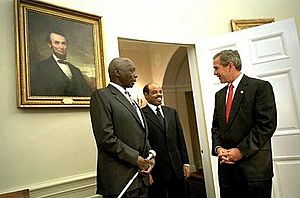
Meles Zenawi and Eritrean President Isaias Afwerki were initially friends. Eritrean forces had helped the TPLF overthrow the Derg. However, their relationship turned sour. In 1998, Ethiopia and Eritrea fought a war over border disputes. Many people were killed, and hundreds of thousands were displaced. A peace agreement was signed in 2000. However, Ethiopian forces remained in some disputed areas.
Somalia
In 2006, the Islamic Courts Union took control of much of southern Somalia. The Transitional Federal Government of Somalia sought help. With assistance from Ethiopian troops and others, they managed to push out the Islamic Courts Union. In October 2011, a joint operation began against Al-Shabaab in Somalia. The Ethiopian military joined this mission.
Climate Change
Meles played an important role in developing Africa's position on climate change. In 2009, he was appointed Chair of the African Heads of State and Government on Climate Change (CAHOSCC). This group aimed to create a common African stance on climate change.
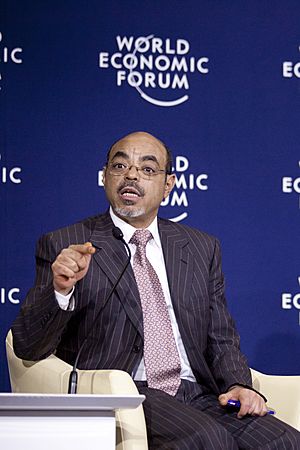
The Africa Group made demands for funding to help African countries adapt to climate change and reduce emissions.
Illness and Death
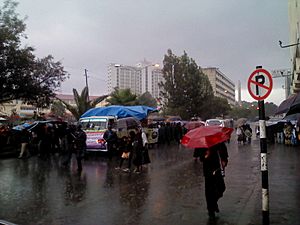
In July 2012, people began to wonder about Meles's health. He did not attend important meetings. The government announced that he had been hospitalized but said his condition was not serious. On 20 August 2012, Meles Zenawi passed away in Belgium due to an infection.
His body was brought back to Ethiopia two days later. Thousands of people gathered to pay their respects as his coffin, covered in the Ethiopian flag, was carried through the streets. Political, military, and religious leaders, along with diplomats and his wife, attended the event. A period of national mourning was declared.
Meles's funeral took place in Addis Ababa on 2 September 2012. Many African presidents and thousands of Ethiopians attended the religious ceremony.
Reactions to His Passing
Many leaders and organizations shared their thoughts after Meles's death.
- Ethiopian Olympic gold medalist Haile Gebrselassie praised Meles's achievements.
- United Nations Secretary-General Ban Ki-moon spoke highly of Meles's leadership.
- Israel Prime Minister Benjamin Netanyahu called Meles "a true friend of Israel."
- United Kingdom Prime Minister David Cameron called Meles "an inspirational spokesman for Africa."
- United States President Barack Obama said Meles deserved recognition for his work to develop Ethiopia. He also praised Meles's efforts for peace and security in Africa.
- South Korean President Lee Myung-bak called Meles "a great leader of Ethiopia."
Personal Life
Meles earned a master's degree in business administration from the Open University in the UK in 1995. He also received a master's degree in economics from the Erasmus University in the Netherlands in 2004. In 2002, he received an honorary doctorate from Hannam University in South Korea. Meles was married to Azeb Mesfin, who was also a rebel fighter. They had three children: Semhal, Marda, and Senay Meles.
His Legacy
Ethiopia's Economic Growth
During Prime Minister Meles Zenawi's time, Ethiopia's economy grew significantly. The country saw double-digit economic growth for his last nine years in office. This growth continued after his death, as his party kept similar policies. Ethiopia became the fastest-growing economy in Africa.
Awards and Honors
Prime Minister Meles received several international awards for helping Ethiopia develop. While Ethiopia is still a developing country, its rapid economic growth is seen as a step towards ending poverty.
- Meles received the Haile Selassie I Prize Trust award as an outstanding student.
- The Rwanda government gave Meles two medals in 2009 for helping to liberate Rwanda and end the genocide.
- Tabor 100, an African American business organization, honored Meles in 2005. They recognized his work for economic and social change in Africa.
- Meles received the Good Governance Award from the Global Coalition for Africa. This was for leading Ethiopia towards democracy during a challenging time.
- He was awarded the 2005 Yara Prize for Green Revolution. This was for starting a strong foundation for economic progress in Ethiopia, especially in farming.
- The Africa Times newspaper gave Meles the Africa Political Leadership Award of 2008.
- Ethiopia's military honored Meles for his leadership during the 1998–2000 war with Eritrea.
- The people of Axum honored Meles for his role in bringing back the Obelisk of Axum from Rome.
- Meles received a Gold Order of Merit award from the Confederation of African Football (CAF) in 2007. This was for his help in developing African football.
Important Roles
- Meles was a co-chairperson of the Global Coalition for Africa (GCA). This group brings together African leaders and partners to discuss development issues.
- He served as the Chairman of the Organization for African Unity (OAU), now the African Union (AU), from 1995 to 1996.
- In 2007, the African Union chose Meles to lead the executive committee of NEPAD (the New Partnership for Africa's Development).
- Meles represented Africa at the G8 Summit and the G20 summit in London.
- In 2010, the UN named Meles as co-chair of a new advisory group on climate change financing.
Key Achievements
Several important developments happened for the first time in Ethiopia under Meles's leadership:
- The first regional vote for peaceful separation (Eritrea, 1991).
- The first multi-party national elections with opposition parties (2000, 2005, 2010).
- The first official freedom for different languages at the local level (since 1994).
- The first ethnic-based federalism system (since 1994).
- The first private media outlets in Ethiopia's history (since 1994).
- The first time Ethiopia had continuous double-digit GDP growth (since 2006).
- The first multi-party parliament with opposition members (since 2000).
- The first unrestricted freedom of religion for evangelical and Pentecostal Christians (since 1994).
Foundation
Meles received a financial prize of $200,000 from the Norwegian Yara Foundation in 2005. He donated this money to a foundation called "Fre—Addis Ethiopia Women Fund." This foundation helps girls get an education, especially those who are in need or are orphans. It supports hundreds of girls across the country.
Images for kids
See also
 In Spanish: Meles Zenawi para niños
In Spanish: Meles Zenawi para niños
 | Roy Wilkins |
 | John Lewis |
 | Linda Carol Brown |


